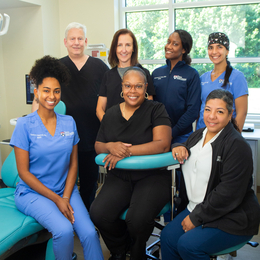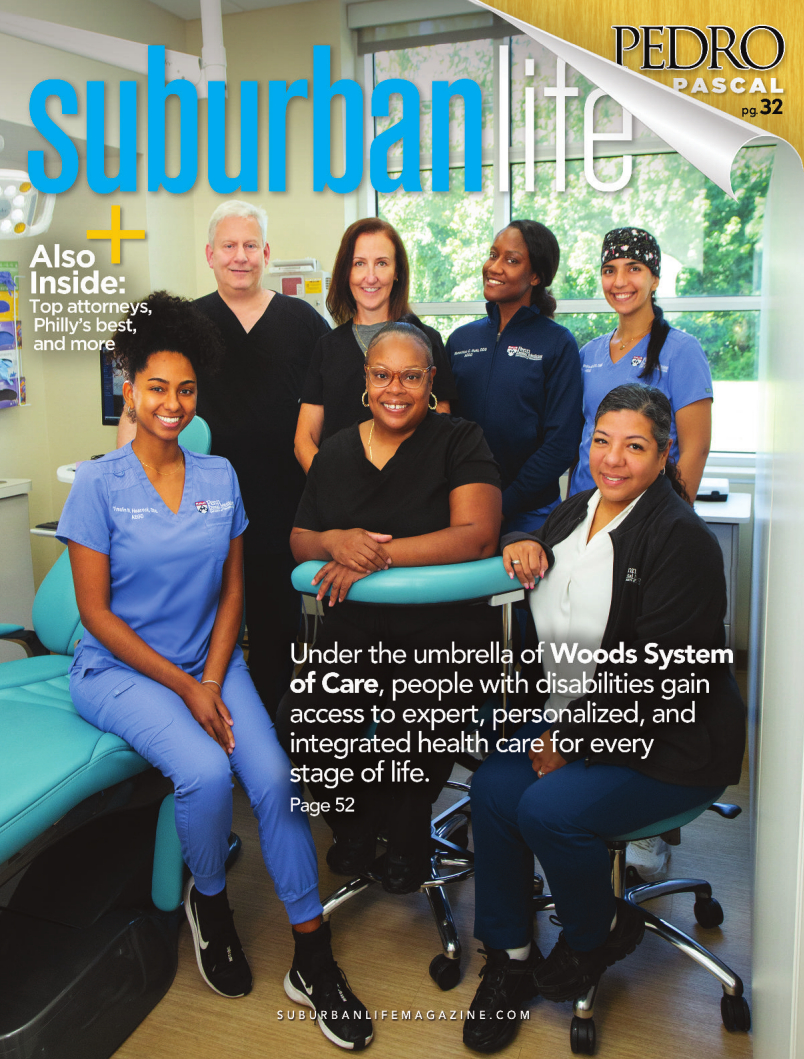
Better Care for Better Outcomes
Under the umbrella of Woods System of Care, people with disabilities gain access to expert, personalized, and integrated health care for every stage of life.
With the 1990 passing of the Americans with Disabilities Act, people with special needs won the legal right to qualified medical care. Even so, many people with disabilities find that lingering barriers still stand in the way of true equity in health care; some of the barriers are physical, such as a lack of specialized equipment, while others are rooted in communication or a lack of knowledge among health care providers.
Woods System of Care has gone to great lengths to break through those barriers. Having served more than 55,000 residents of Pennsylvania and New Jersey to date, Woods System of Care maintains a sprawling and still-growing network of providers who offer highly specialized services to people with autism, medical and behavioral health complexities, and intellectual and developmental disabilities. Rooted in the concept that better care will deliver better outcomes, Woods provides access to qualified, personalized, and integrated health care for each stage of a person’s life.
“We have created a network with a ‘no wrong door’ approach, literally meeting people’s needs across their lifespan,” says Kristen Farry, Executive Vice President of Policy and Strategy, Woods System of Care. “In addition to everything we do with health care, we also have special education, group housing, and vocational training; we even have a senior daycare center for older adults with disabilities. We do a lot for the people we serve, and we’re always looking to do more.”
Woods delivers world-class medical, dental, and behavioral care at outpatient locations in Langhorne and Hamilton Township, New Jersey, with another coming soon to Exton. Every patient’s treatment plan is tailored to their precise needs and situation, according to Marc Henschel, D.D.S., who leads the clinical team at Penn Dental Medicine at Woods.
“If you meet one individual with autism, you’ve met one person with autism,” says Dr. Henschel. “Everyone who has autism is on a different degree on the spectrum, and each is going to react to treatment differently. As clinicians, we need to understand the disease-scape and how it affects the individual, and then learn how to modify their treatment accordingly.
“Dentistry is dentistry, regardless of the patient,” he continues. “The difference lies in the educational knowledge of how to handle each individual patient with a disability, and the accommodations needed to treat that patient successfully.”
The Penn Dental Medicine at Woods Mikey Faulkner Dental Care Center in Langhorne includes five spacious operatories equipped with the latest “bells and whistles,” including digital X-rays and glide chairs that allow for easier patient positioning and transfers, especially for those in wheelchairs or with limited mobility. Since opening its doors in January 2023, the center has performed more than 15,700 procedures, ranging from routine oral examinations and cleanings, to restorations and crowns, to root canals and extractions, among others. Members of the dental staff collaborate with their counterparts from the Medical Center at Woods, which is located on the same campus, for seamlessly integrated care.
Some patients will come to the dental clinic with phobias or severe apprehension, but the staff is well equipped to “meet the patient where they are.” While the clinic does offer light sedation for those who need it, a slow and steady desensitization approach tends to make most patients comfortable enough to receive treatment without sedation.
“For their first visit maybe they get as far as the waiting room but they don’t feel comfortable going any farther,” Dr. Henschel adds. “In those cases we’ll go out [into the waiting room] and do our initial oral examination with a traditional toothbrush and show them how to brush their teeth. Fifteen minutes might be all we can do, but that’s a good first step for the next visit. Hopefully in subsequent visits we walk can them into the operatory, and by the third or fourth visit we get can them to sit in the dental chair.”
Dr. Henschel’s interest in treating patients with disabilities began while he was at New York University College of Dentistry, where he served as director of the college’s Special Patient Care Clinic. He also welcomed patients with disabilities into his private practice in Forest Hills, New York. Now, as director of the Advanced Education in General Dentistry (AEGD) program and associate clinical professor at Penn Dental Medicine, he’s grateful for the opportunity to help future generations of dentists follow in his footsteps.
Residents enrolled in the year-long AEGD program will devote significant time and energy to treating patients with disabilities—as much as 40 percent of the patients they see—either from Woods’ close to 500 residential clients or from the surrounding community. In its first year, the program had four residents, a number that has since grown to 14.
“The goal of the program is to train future dentists to not shy away from treating people with disabilities,” he says. “Not every patient can be treated easily, but the majority of patients should be able to if you think outside the box and treat them with the best evidence-based care we know of. And we think we do a very good job.”
He recalls a phone call he received from a former resident who went on to join a dentistry practice in Massachusetts. The former resident brimmed with excitement as she explained to Dr. Henschel that she had recently treated a patient she treated during her residency at Woods—and, in the process, opened the practice up to a new population of patients.
The Medical Center at Woods provides primary care, chronic disease management, illness and injury care, and wellness services. Providers work hand in hand with those at the dental center as well as the Center for Behavioral Health at Woods, which offers counseling, medication management, autism and psychiatric assessments, and much more for individuals with and without disabilities.
“Our integrated care model uses evidence-based and consistent care and provides trust in a community where it is often difficult to find high-quality compassionate care,” says Stephen J. Kolesk, M.D., Chief Medical Officer, Vice President for Medical Affairs, Woods Healthcare.
Dr. Henschel says the Langhorne facility has been “going great” since opening its doors. With continued growth, he expects the center to be able to expand the care it delivers to patients with more days of clinical operation each week, apart from its current schedule of Monday, Wednesday, and Friday.
“I recommend people to take few minutes to google what we offer at Penn Dental Medicine [at Woods],” he adds. “See what we do and how we do it, why we do it, and then make an educated decision. They won’t be disappointed if they decide to come here.”
For more information about Woods System of Care and its scope of services in the Philadelphia area and across the river in New Jersey, visit www.woods.org. For more information about Woods Healthcare, visit woodshealthcare.org or call (215) 750-4004.
Photo by Alison Dunlap
Published (and copyrighted) in Suburban Life, July 2025
Published (and copyrighted) in Suburban Life, July 2025



